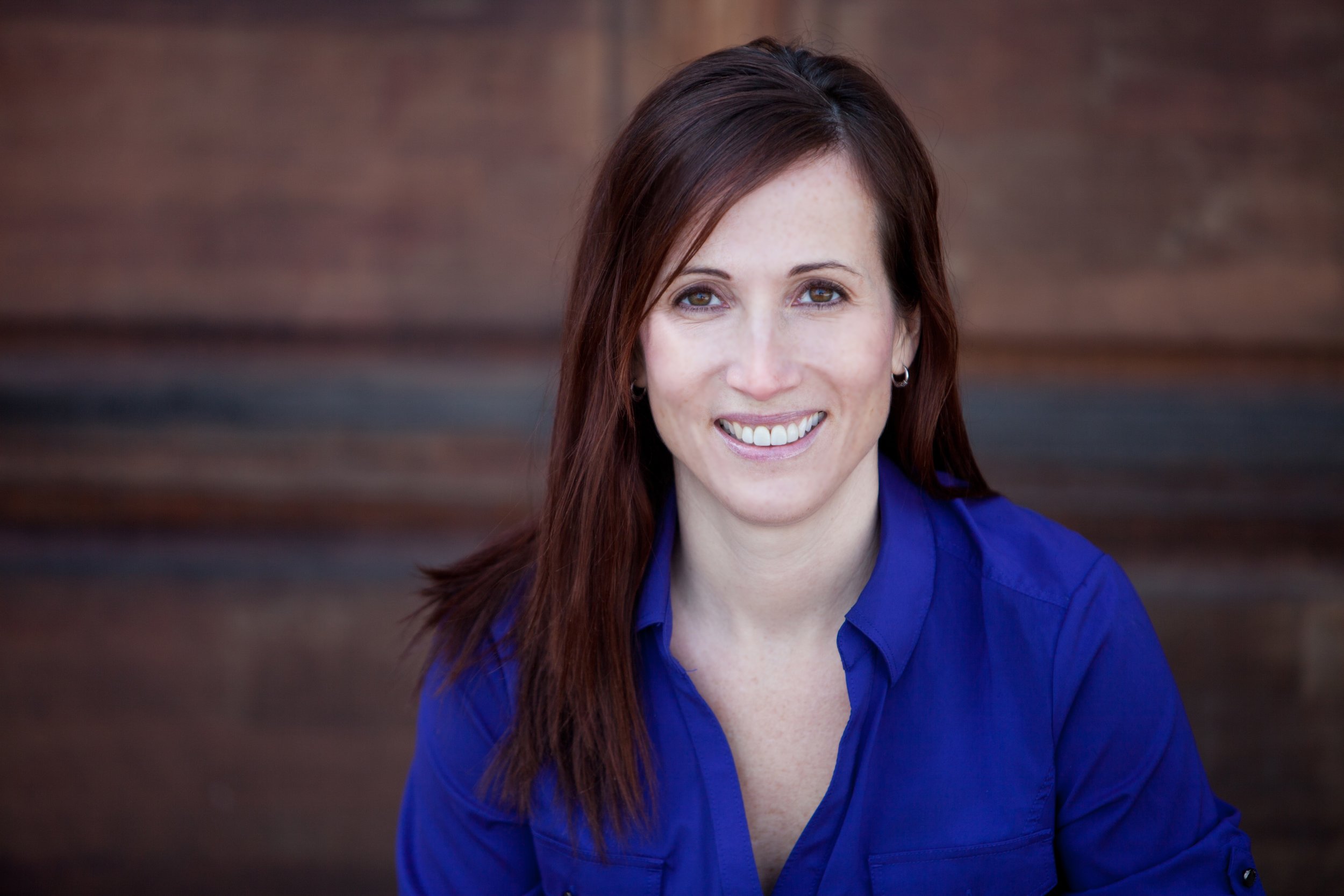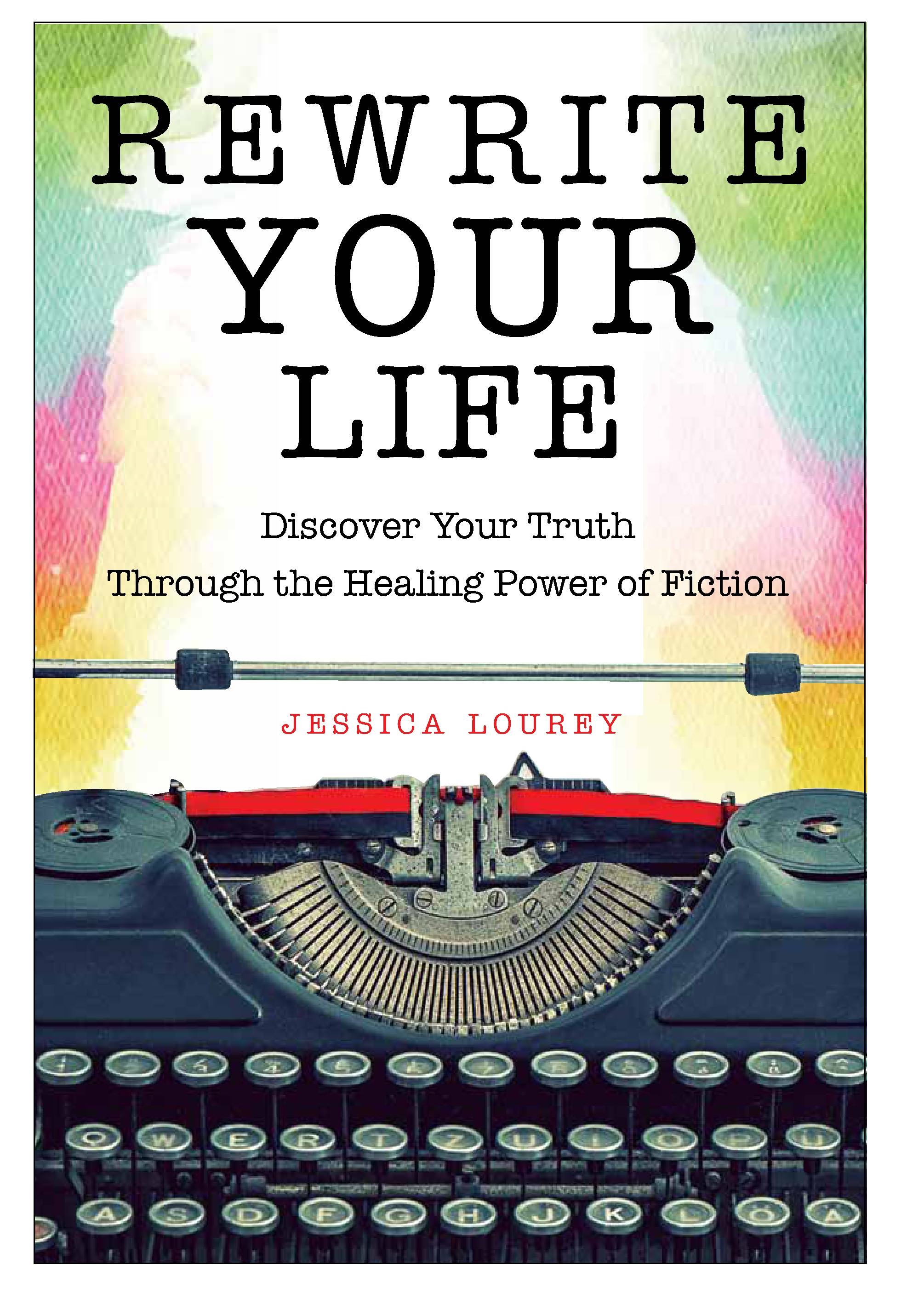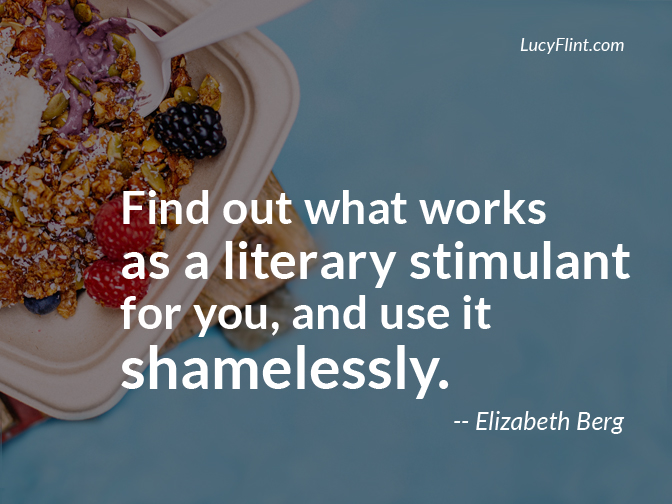You know that feeling of being hit between the eyes when you read something: hearing your own life in someone else's words?
For me, it was equal parts electrifying and clarifying, when I read this in The Artist's Way:
If a child has ever been made to feel foolish for believing himself or herself talented, the act of actually finishing a piece of art will be fraught with internal shaming.
WHOA, I thought. That sounds ... eerily familiar.
I kept reading:
Many artists begin a piece of work, get well along in it, and then find, as they near completion, that the work seems mysteriously drained of merit. It's no longer worth the trouble.
How did Julia Cameron know what I'd been doing with my writing projects for so long? How was she so dang accurate??
I felt stunned, glued to the page. And she didn't let up:
Often we are wrongly shamed as creatives. From this shaming we learn that we are wrong to create. Once we learn this lesson, we forget it instantly. Buried under it doesn't matter, the shame lives on, waiting to attach itself to our new efforts. The very act of attempting to make art creates shame.
This is the part when I put the book down and staggered around my house, saying, "Everything makes sense now!!"
And this is when my sister told me about Brené Brown's work on shame and I began devouring everything I could find about it.
Because those paragraphs were talking about me. My childhood.
And the mega-frustrating cycle that had trapped me, one work-in-progress after another.
Each project seemed to blow up in my face, just as I got to the halfway point. And I went back to the drawing board, convinced down to my toes that I needed forty more skills (and at least five more how-to books) to write the work in question.
I thought I was the problem—too skittish, too perfectionistic, too lazy, or just too stupid. I couldn't tell: one of them, or maybe all four.
Whatever the root cause, I was getting really, really tired of people asking me, "when will your book be done," and my falsely cheerful reply, "Not sure, but thanks for asking!"
But now, thanks to Julia Cameron, I had a way in. There was some shame lurking in my past, something that I'd buried deep. And somehow that was part of this problem.
And thanks to Brené Brown, I could figure out what to do next.
... And since I know I'm not the only one dealing with this stuff, let's talk it through.
Let's have a little heart-to-heart about shame in our writing lives.
Brené Brown says that shame (she calls it "the gremlins") has two main messages. It's the ugly voice in our heads that says, "You're not enough."
And it's other main message is, "Who do you think you are?"
MEAN, isn't it?! Ack! And if I'm having a slightly off day at the writing desk, that's what I get in my head.
How about you? Any of that sound familiar?
If I'm not careful, I can hear that whining, nagging voice start up:
Your book isn't good enough, interesting enough, important enough. Your characters are flat and foolish and your dialogue is all dumb. The settings are cardboard. You're not good enough at social media. Your website is super dull and basic and you keep saying you're going to fix that and then you don't. There are a thousand things you could be better at right now. You'll never...
And on and on and on.
It boils down to this: Lucy? A writer? Pah. She's not good enough to pull that off.
On the other hand, if I'm doing okay, and if I'm working on the plans for revision and educating myself about the publishing process, then the other voice starts up.
Oh? Oh really? Publishing, hmm? You were a boring kid, a boring teenager, and a boring college student. If you ever had talent, it's definitely gone by now. Why would anyone want to hear what you have to say? Who do you think you are?
... Is that familiar to you at all?
Let's all take a moment to blow a loud blast on the airhorn of clarity. Because this, my friends, is not the voice of truth (though we TREAT it that way!).
It's the voice of shame.
Which is why I am steeping myself in the book Daring Greatly. Because Brené Brown is talking all about a process she calls shame resilience.
This is the process by which we can encounter shame, deal with it, and, as she puts it, "come out on the other side ... with more courage, compassion, and connection than we had going into it."
Whew!! That sounds amazing to me.
Okay. Field trip: Take two minutes and check out this lightning-quick video on how to combat shame. (If you'd like a more thorough description of how to move through shame, with an example, check out this great article on Brené Brown's blog as well.)
Shame resilience. I love those steps. I am super new to this process, but I'm learning and practicing it, one baby step at a time.
Let's go through them:
Understand what triggers shame for you. And reality check those messages of shame.
What are the gremlins saying in that moment? What are they telling you you should be?
And then, is that message even true? Are those values your values? Does this even apply to you?
Stare very hard at the voice, the message, and say: Is this legit?
I love this next one. She puts it beautifully in the book. She says in the midst of a shame attack, she needs to:
"Talk to myself in the way I would talk to someone I really love and whom I'm trying to comfort in the midst of a meltdown."
I love that. I love that.
We would NOT say: You're right! You're a really boring person! And you're terrible at writing! These paragraphs are a mess! Have you ever heard of topic sentences?!
What would we say instead?
Think of who that is. Who brings out your tenderness, your compassion? Who would you never be harsh with?
What would you say to that person in this situation?
I'm imagining my oldest niece, coming to me and saying that she feels like she's a bad writer, that she'll never be any good, that she has no talent.
And I can feel all my righteous aunt-ness rising up in me: Drafts are supposed to be messy, darling! They're supposed to be imperfect. You are doing wonderfully. Let's take it step by step.
Use those same words you'd give to someone you love. Use that kind, compassionate tone. Use them on yourself, in the face of the gremlins.
Tell your story. Connect. Reach out. Own your story.
She makes the very good point that you share your story with someone who has earned the right to hear it. Not someone who will shame you further, mock you, or use it against you. So, wisdom is definitely called for here.
But I love how she describes owning our stories in Daring Greatly:
Don't bury it and let it fester. ... I often say this aloud: "If you own this story you get to write the ending." ... When we bury the story we forever stay the subject of the story. If we own the story we get to narrate the ending. As Carl Jung said, "I am not what has happened to me. I am what I choose to become."
BAM.
Okay, friends. How are you feeling? Is this hitting a chord?
As I dove into learning about shame, I also started excavating my past. Digging up the dirt, looking around, scouring the area for any hidden messages, any gremlin outposts.
And it's been incredible. SO freeing. So clarifying. And I'm learning to have so much grace for myself.
I processed old stories out loud with my Brené-Brown-loving sister. Then I journaled about them and dug even deeper.
I'm learning that basically anything in my work can operate as a shame trigger: quality of writing, genre I'm working in. Productivity, networking skills, habits.
It's pretty clear: the gremlins loooove to get their hands on anything to do with my work, and to hold me to a perfectionistic, unreachable standard.
It seems like their favorite thing to do is keep me quiet. I've mostly snuck past them with this whole blog thing (yay!), but when it comes to the novels, they dig their claws in deep.
They are sending me a very clear message, and lately I've realized that it's linked to one particular episode from kidhood.
And because I would love to blow the gremlins up (and also because this is a perfect example of how buried shame messes with us), I'm going to dive into this a little bit.
Do you mind coming along with me? I want to own this brief, but long-festering story from my past:
It was fifth grade. My school's administration was really trying its best, I'm sure, and it didn't know it was consigning me to a special little hell...
But when the standardized tests came back and said I was "gifted" (sounds like something out of dystopian YA, yes?), I got to leave class once a week and hop on a bus with a handful of other "gifted" kids, and go to another elementary school, where we could, apparently, all be gifted together.
There were about nine of us on the bus, and I was the only girl. One week, we were supposed to bring our rulers with us.
And I don't remember provoking anything (because I'd already learned to be mouse-quiet).
But for some reason, the boys spent our trip slapping me hard with their metal-edged rulers. All of them. Against mouse-me, in the back of the bus.
Eight versus one—I didn't even try to fight back. Instead, I did what I knew to do: I tried to hide.
I wedged myself between the hump of the wheel well and the overhang of the seat, so that they'd have less of me to hit. And then I literally just rode it out, protecting myself as best I could.
When we got to the school, they filed out and I tried to get up. But fear had done its work, and I was snugged in there pretty tight.
In my memory, it takes a shame-filled eternity, but it probably only took a few moments to wiggle my way free.
(What the heck was the bus driver doing all this time?? I'd like to time travel back and tell him to get with the program. Ahem.)
I went into the school feeling very shaken, foolish, and ashamed somehow.
I didn't tell my teachers. I didn't say anything to the boys. I didn't tell friends.
I tried to pretend it hadn't happened.
I wasn't bruised or cut. So I just sat and learned about whales and nautical charts and used my ruler to work on my map. And then we rode back home.
No big deal.
But it was a really big deal.
There were no marks on me, but I had changed that day. And I received the message, loud and clear: Your gifts are not wanted.
And: This is what happens to gifted girls.
... And that is why, when I read Cameron's words about learning that we are wrong to create, and forgetting it instantly, and saying "it doesn't matter," I heard my own voice. Saw my own story.
That's the same message I hear in myself, halfway through every novel project. When I suddenly feel stricken, exposed: I'm an idiot, what was I thinking, why am I doing this, no one wants to hear this kind of story!
All the encouragement I've received over the years boils away to nothing, and I'm still that fifth grade girl, alarmed at something she doesn't know how to fix, ashamed of gifts and creativity that somehow make her unworthy.
Well, GEEZ. No wonder it's hard to get things done around here!!
So, this is what I love about shame resilience: I get to own this story.
This is me. I am that girl in the ruler story. And I'm also this woman typing.
There is more to my story than that one day, that long-internalized message. And I'm going to write the ending to that ruler story by continuing my work.
By publishing a trilogy that puts evil in its place and gives an eleven-year-old girl a voice and the courage to fight back.
Antidotes and Cures.
I'm not sharing that story as a ploy to receive hugs. I'm sharing it because Brené Brown has convinced me of a few things.
So I wanted to talk about the bus and the rulers because I want to speak my shame story—to pull it out of the dark and let it wither in the beautiful sunlight.
But also because of the power of empathy.
Empathy is the thing that says, You are not alone.
And I know I'm not the only person that this has happened to. Maybe it wasn't rulers on a bus. Maybe it wasn't eight against one.
But I know that there are stories out there like this one, that sent the same message. A message that shows up right when you most need to believe in yourself, and find that you suddenly can't.
I want to reach out to the others who were told to shut up.
I want to send up a flare for the people who got really, really good at being silent, at hiding, at escaping notice.
I want to connect with the people who found out that gifts get you hurt, and it's safer to hide them.
I want to look you all in the face and say, I have been there, I have cried those tears, and you, my friends, are not alone.
I love Daring Greatly and Dr. Brown's other work because she shows that there are tools we can use. There is a proven process. There are resources.
We can learn how to do this!! We can learn to speak to ourselves with love and self-compassion. To practice authenticity.
So, raise your hand, wherever you are, if you've encountered shame in the midst of your writing life. If there's something in your head saying that you're not good enough, or fill-in-the-blank enough.
Raise your hand if you've ever heard in your head, Who do you think you are, to write a tweet, a blog, a novel? Who do you think you are, to share your voice, to write from your perspective?
Who do you think you are, to say anything to anyone at all?
This is when we remember our steps. When we practice them, like the new and special dance they are:
Talk to yourself like you are someone that you dearly love.
Reach out to someone you trust.
Speak your shame. Tell—and own!—your story, so that you can write the ending.
In Daring Greatly, she gives this great example of how we can talk back to shame. She writes:
Shame whispers in the ear of the woman who's out of town on business, "You're not a good mother because you're going to miss your son's class play."
She replies, "I hear you, but I'm not playing that tape today. My mothering is way bigger than one class performance. You can leave now."
I freaking LOVE that.
And so I'm practicing.
I'm trying to catch that smothering sensation when it comes, that feeling that silence and hiding are the only things that can keep me safe. Because who am I, to dare to have a voice?
And I'm saying, "Shame, I hear you. But I'm not playing that tape today. I'm choosing courage as a value. Courage is even more important to me than the suffocating safety you're offering. And that means I'm showing up and speaking up. You can go now."
... I may or may not seal that with a little heck-yes dance move.
What's your version? What can you say back, when that nasty gremlin voice shows up?
What can remind you of self-love and self-compassion? What can bring you back to authenticity?
Who do you trust to tell your shame stories to? And what old stories is it time for you to own?
This is a tough battle, my friends. But it's one that we can (and must!) learn to win.
Because the gremlins are lying. Because we really are enough, just as we are. Because we all have voices and stories that need to be heard, to be written, to be read.
Don't let shame silence you.

















